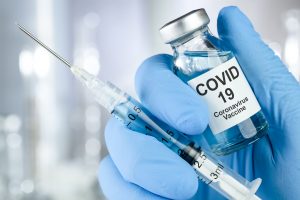Japan has ramped up mass vaccinations of the elderly in the worst-affected cities of Osaka and Tokyo, which are battling the spread of highly contagious COVID-19 variants.
Two large scale venues in Osaka and Tokyo have been set up by the Ministry of Defense and run by Japanese Self Defense Force medical personnel with the aim of speeding up the inoculation of Japan’s 36 million elderly people. The vaccine rollout launched in February and initially targeted healthcare professionals, followed by the elderly and those vulnerable to serious health conditions.
Chief Cabinet Secretary Kato Katsunobu said Japan is progressing toward its goal of administering 1 million Pfizer and Moderna vaccine doses each day. The government aims to complete vaccinations for the elderly by the end of July. Meanwhile, local municipalities in Tokyo announced that vaccines for the general population would start as early as mid to late June. Prime Minister Suga Yoshihide pledged to complete all vaccinations of the entire population by November.
Mass vaccination venues opened their doors to senior citizens two weeks ago, but reservations have been well below expectations. The venues carry a daily capacity of 1,800 people; however, on opening day only 89 people arrived for the jab. Reservations have fallen steadily, and 76 percent of appointments remain available in Tokyo and 93 percent in Osaka for next week. Concerns over taking public transport during the current fourth wave of COVID-19 infections and the reluctance to travel long distances have been cited as a major barrier for the elderly.
Japan is determined to hold a successful Tokyo Olympics and Paralympics, but the delay in securing vaccines and its sluggish vaccine rollout has attracted widespread criticism. Japan’s pace of vaccinations has accelerated in the last month and it announced it had surpassed 20 million administered doses of the COVID-19 vaccine as of June 9. However, on a global level Japan’s vaccination drive is not only behind developed countries, but the world as a whole. Nikkei Shimbuns’s vaccine tracker shows that the total number of doses administered per country is roughly 808.96 million in China, 303.82 million in the U.S, 233.68 million in India, 74.54 million in Brazil, and 29.61 million in Indonesia.
Nomura Research Institute has determined that 40 percent of the Japanese population will need to receive a first dose before life can return to normal. If 1 million doses are administered every day starting from this week, the target could be achieved by August 20. Currently only 8.1 percent of the Japanese population has received their first shot and less than 4 percent (as of June 8) have been fully vaccinated. This is in stark contrast to 60 percent of the entire population of Israel and Canada and 50 percent of the U.S. who are fully vaccinated.
The seven-day average of new daily COVID-19 infections has fallen to 391.7 in Tokyo, down from over 700 cases a day in late May. However, Osaka is still reeling from a record high number of people infected with COVID-19 variants requiring more hospital beds compared to the previous outbreaks. Osaka, Japan’s third largest city, has recorded 2,480 deaths – the highest death toll nationwide. The sudden spike in deaths was attributed to patients with mild to moderate symptoms dying suddenly overnight after being sent home, due to COVID-19 designated hospital beds being unavailable.
Despite concerns over the growing strain put on the medical system and public pressure to cancel or postpone the Tokyo Olympics, the government is making final preparations to host the rescheduled Games starting July 23.
The current State of Emergency (SoE) in 10 prefectures across Japan will be lifted on June 20. A panel of senior health advisers warned of another potential rebound of infections in August if the SoE is lifted on June 20 irrespective of whether vaccinations of the elderly are completed.
The mayor of Osaka, Matsui Ichiro, is calling for appropriate infection control measures that will support the medical system along with accurate forecasts of COVID-19 infections after the SoE is lifted in order to prevent the medical system from being overwhelmed again.
The IOC says they anticipate 80 percent of athletes and officials will be vaccinated by the time they participate in the Tokyo Olympics. The IOC has teamed with Pfizer to offer approximately 20,000 people involved in the Games vaccines free of charge. This includes athletes, referees, and interpreters. The local organizing committee is also considering the expansion of the free vaccine program to include 70,000 volunteers and domestic media personnel. Japan’s Olympics Minister Hashimoto Seiko told reporters on Wednesday that offering vaccines to people from overseas for the Games is a form of “hospitality.”
The IOC stressed that 14 days of quarantine is “absolutely essential” for vaccinated media and other officials entering Japan, which they call the “basic premise of the Games.”

































